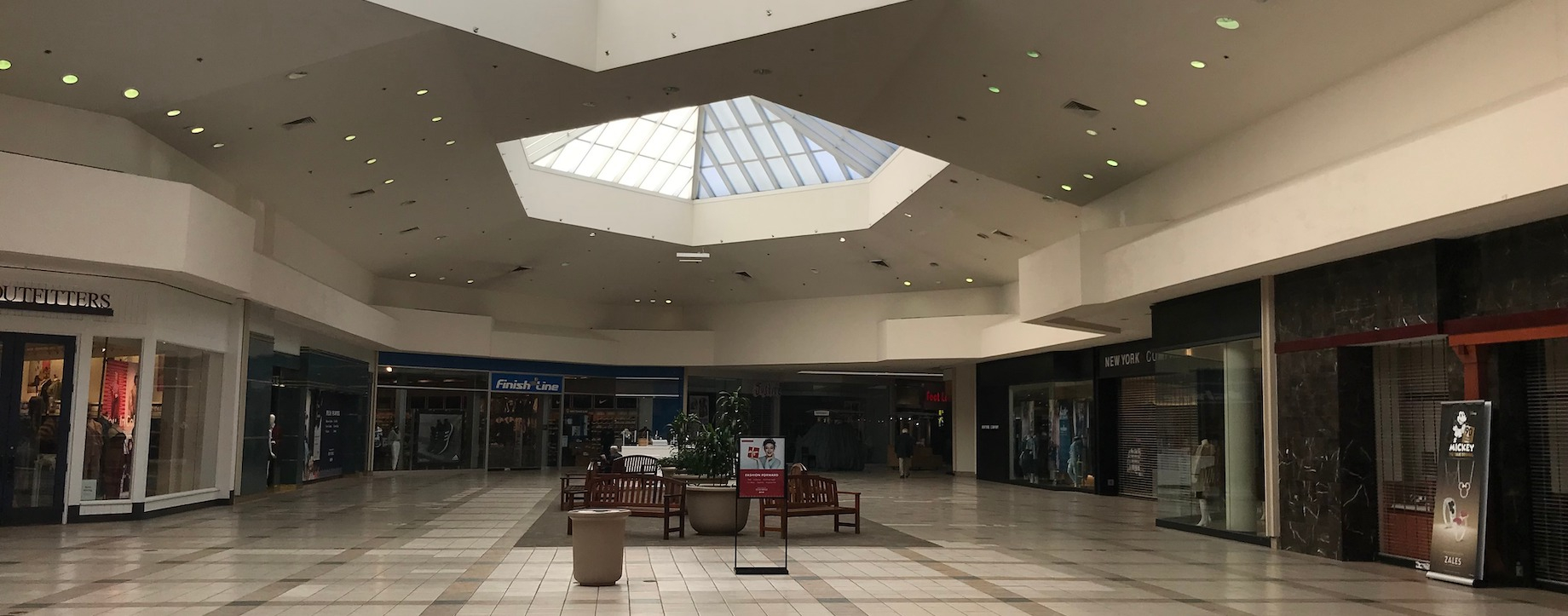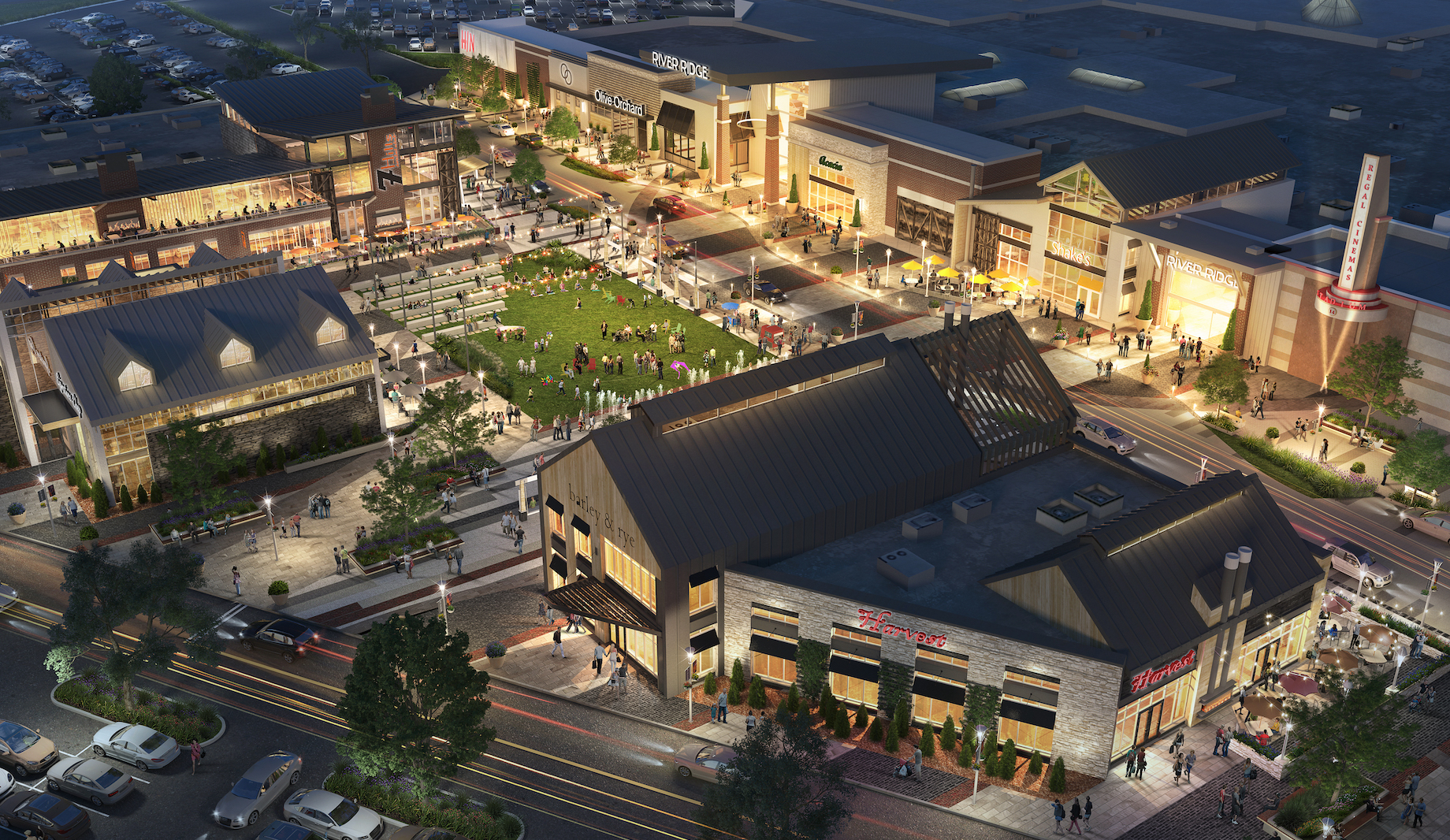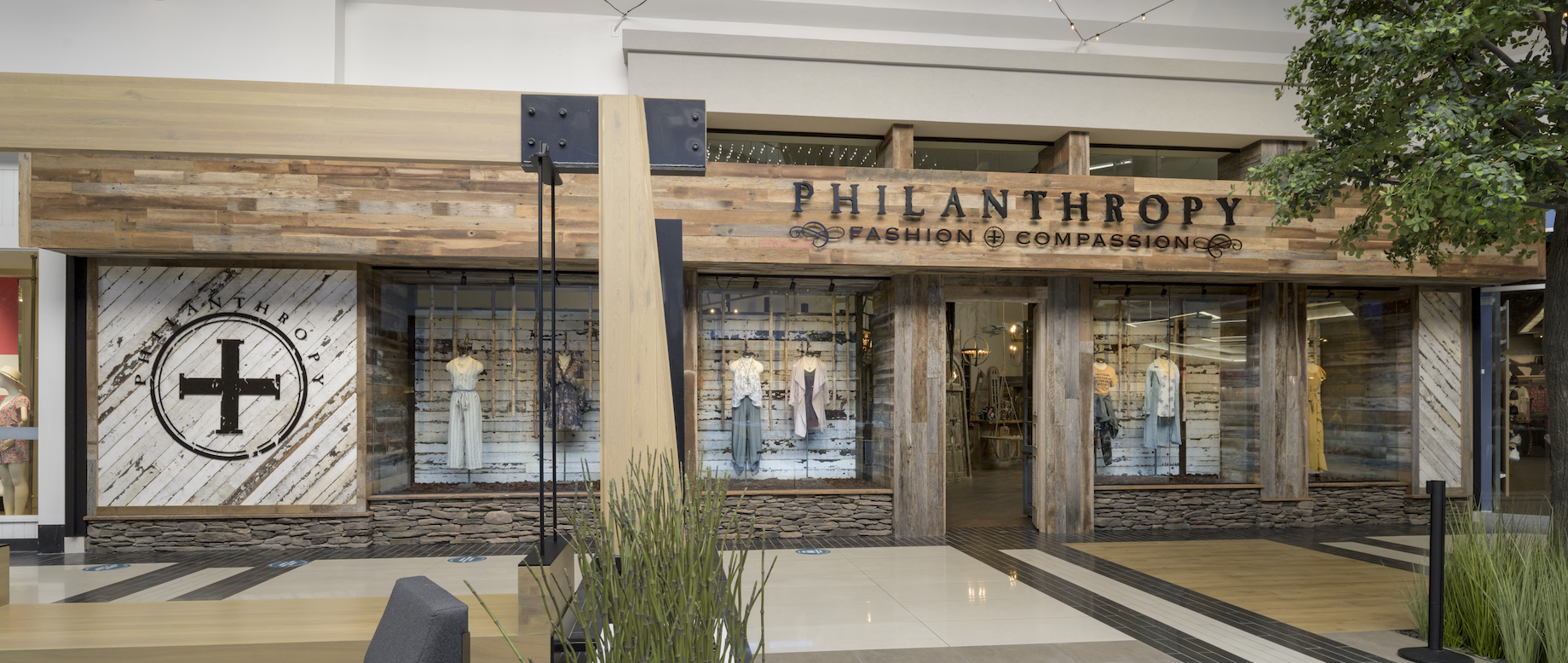For years, Lynchburg, Virginia-based Liberty University officials watched as campus-adjacent River Ridge Mall lost patronage, anchors and national tenants in an all-too-familiar scenario for secondary-market malls, according to Liberty University vice president of real estate Craig Pettitt. Anxious to preserve its environment, Liberty launched a bold strategy: Buy up the center in pieces using its other mall holdings there as collateral. In a seven-year span, Liberty purchased the entire center. “It could have become an eyesore, and being less than a mile from campus, we decided to invest in it,” Pettit said. “We really didn’t want to see another struggling mall facing oblivion.”
How It Played Out
Liberty acquired the Sears space from CBL in October 2012, before the store closed in early 2013. Later, Liberty occupied the space to support the school’s burgeoning online enrollment. Using that space as collateral, Liberty bought another three-quarters of the center in March 2016, as CBL was clearing out many of its midmarket mall assets. At the time, then-university president Jerry Falwell Jr. said the deal would serve the dual role of making money for the university and promoting retail to the benefit of the city.
Dick’s Sporting Goods now occupies the former Sears.
About a year later, Liberty purchased the mall’s newly vacant Macy’s. In August 2017, it bought the rest of the center, save for department stores Belk and JCPenney, both of which were retailer owned and still operating. Renovation and retenanting began in earnest soon after JLL came aboard as mall manager in late 2018.
River Ridge remains the only regional mall within a 55-mile radius of the campus. The center “brings the buying power of more than 45,000 students, making it a top destination for retailers looking to expand in the region,” JLL stated when it took over.
In need of an entertainment anchor, Liberty cut a friendly deal to open a SeaQuest interactive aquarium in 22,000 square feet near the facility’s center court. It immediately became a traffic generator. Patrons queued up down mall halls on opening day in October 2019 to witness SeaQuest’s more than 1,200 creatures from five continents in themed sections like Caribbean Cove and Amazon Rainforest, as well as SeaQuest’s 36,000-gallon tank. “Typically, you will see those type of uses at a mall facing outside, but we wanted families and kids who come to the property to see everything else here,” Pettitt said.

River Ridge’s center court before …

… and after
Liberty soon demolished the old Sears to make way for an outward-facing town center-style façade. Dick’s now occupies much of that space. In spring 2021, Liberty also knocked down the closed Macy’s to create the West End District, an open-air restaurant and entertainment hub with some traditional retail and personal services. Its first food tenant, a new concept called Papa Gallo Cocina Mexicana, will debut in the spring with indoor and outdoor seating.

River Ridge’s West End District will feature slightly higher store elevations, urban-storefront designs and family-oriented green space for events.
The Advantage of Private Ownership
Because Liberty is a private owner, the mall is free of the short-term revenue demands that public owners face; it has no lenders or other public stakeholders questioning tenant incentives and finish-out costs, said Pettitt, whose resume includes stints with Brixton, JLL and Trizec Hahn. “We knew we had to make some aggressive, almost no-risk deals for tenants to turn the tide. And our real estate committee realized that, so we were able to move quickly.”
He added: “We see our relationships with tenants as partnerships, and we feel like we’re in this together. The days of the big bad landlord are gone.” The university already owned flooring, lighting and materials and had construction talent, “so we can do things faster and more economical,” said Pettitt. “Most smaller merchants don’t have access to that kind of expertise, but we can we go in and knock out walls quickly and work with our tenants.”
Liberty also served as store franchisee to make one tenant deal work. A shuttered Hallmark store became the second location of a Franklin, Tennessee-based concept called Philanthropy. The Liberty-operated Philanthropy shop opened in 2020 next to American Eagle. U.S. marketplace owners are becoming store franchisees with increasing frequency. It’s an approach long common in the Middle East and elsewhere abroad, Pettitt noted. Casinos have been doing so for decades at their shopping arcades in the U.S. and worldwide, he said.
RELATED: Another Way for Retail Landlords to Backfill: Become a Franchisee
Liberty invested in other tenants, too, providing a permanent space for pop-up bakery/brunch haunt Simply Vanilla Gourmet Cheesecakes, for example. “There aren’t enough national tenants around, so we’re finding locals that are unique and different,” Pettitt said. Recent leases include vintage home decor seller Blue Mountain Barn, Carter Bates women’s apparel and accessories, Auntie Anne’s, Cinnabon and seasonal pop-ups like L.L.Bean.

A percentage of sales from Philanthropy — upscale, faith-based home decor and women’s apparel company — goes to philanthropic causes. Liberty University is a franchisee owner of this location.

Colleges and Universities Buying Retail Properties: A New Trend?
Acquiring retail real estate is not a new strategy for Liberty, which purchased campus-adjacent centers Fort Hill Village in 2016, Candlers Station in 2010 and The Plaza in 2007, all of which continue to operate as retail. Liberty also bought a Wyndham Hotel, a restaurant building, a former resort in nearby Campbell County dating back to the 1870s, and the oldest-known standing structure in the Lynchburg area, Mead’s Tavern in New London. The tavern dates back to 1763. The college has spent more than $1 billion over the past eight years constructing or renovating area buildings, Pettitt said.
Universities traditionally buy multifamily, office and industrial to expand academic, housing and services, but retail property investment is becoming a trend. Over the past three years, the University of Minnesota snapped up Stadium Village Plaza and two smaller centers just off campus in what it calls its Minneapolis “arrival gateway.” A few years ago, North Carolina’s High Point University bought the 11-acre, Food Lion-anchored College Village next to campus. In Hyde Park, The University of Chicago recently added a Jewel-Osco grocery store and a Study Hotel to its portfolio.
Neighborhood-stabilization efforts usually spur such purchases, said James Shilling, a professor in the DePaul University Real Estate Center. In fact, The University of Chicago likely was motivated to purchase Jewel-Osco “to buy its surroundings” to combat crime, he said.
Peripheral real estate provides cheap incubator space for colleges, as well, he said. Austin Community College, for example, bought the former Highland Mall in 2012 and transformed the former JCPenney space into an open-plan learning lab.

At River Ridge, concerns that the religious-oriented Liberty University would oust such tenants as Victoria’s Secret or prohibit alcohol sales or certain cinema fare haven’t materialized, Pettitt said. Moreover, initial tenant skepticism over university control “have been replaced with optimism,” he said. Of Liberty’s approximately on-campus students, 20% to 30% visit the mall during the school year, he estimated.
How are tenants faring? “Our comp sales are up 30-plus percent over 2019,” Pettitt said, “so I would say very well.” Regal Cinema, a holdover anchor, is posting top-tier numbers among the chain’s locations, he said, and the Lynchburg SeaQuest consistently ranks in the top three among the chain’s 10 locations, besting Roseville, Minnesota, which is a 10-minute drive from Mall of America. Dick’s Sporting Goods, T.J.Maxx and Sephora are among other tenants at River Ridge.
COVID-19, Pettit noted, was “a punch to the gut for us” that slowed leasing momentum to a crawl as the renovation was unfolding. “We were teed up with 34 national deals, and some of these are just starting to come back.” At press time, the center was negotiating with a large home-store operator and what Pettitt called “a Dave & Buster’s-like” entertainment tenant.
By the time the dust settles, Pettitt said, the university will have plowed more than $70 million into renovating a mall on the downswing “into a very vibrant place.”
By Steve McLinden
Contributor, Commerce + Communities Today